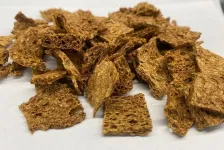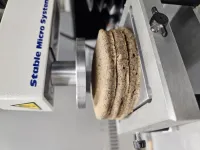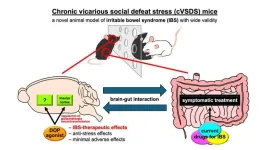Using sugars from peas speeds up sour beer brewing
2025-02-05
(Press-News.org) Sour beers have become a fixture on microbrewery menus and store shelves. They’re enjoyed for their tart, complex flavors, but some can require long and complicated brewing processes. Researchers reporting in ACS’ Journal of Agricultural and Food Chemistry brewed new sours in less time using a seemingly strange ingredient: field peas. The experimental beers had fruity — not “beany” — flavors and other attributes comparable to a commercial Belgian-style sour, but with shorter, simpler brewing steps.
“Sour beer is the beer enthusiast’s alternative to Champagne. By using sugars derived from peas that yeast cannot metabolize, we promote the growth of bacteria essential for producing sour beer,” says Bjørge Westereng, one of the study’s authors.
The characteristic mouth-puckering taste of a sour beer comes from acids made by lactic acid-producing bacteria (LAB) or Brettanomyces yeast, which are added by brewers or introduced naturally from the environment. However, these microbes often require months or even years to ferment the original sugary, steeped-grain liquid (wort) into a desirable drink. So, Westereng, Philipp Garbers, Catrin Tyl and colleagues have been searching for sugars beyond those found in traditional grain for the LAB to nosh on that might speed up the fermentation process.
Previously, they tried molecules derived from wood. But this time, they turned to a group of plants called pulses, which includes beans, lentils and peas. Pulses have historically been underutilized largely because of their tendency to impart beany flavors to foods. But they’re considered sustainable and easy to grow, and contain sugars called raffinose-family oligosaccharides (RFOs), which LAB can easily use as a food source. In the new research, the team brewed sour beers with RFOs extracted from field peas and compared the final product to a commercially available Belgian sour.
Using three different LAB, the researchers brewed four experimental sour beers: two with the field pea RFOs and two without. All four were fermented for 19 days with Brettanomyces clausennii yeast together with combinations of LAB. After chemical analysis and evaluation by a trained sensory panel, the team discovered that the beers brewed using the RFO extract had:
More lactic acid, ethanol and fruity flavor-imparting compounds than the beers brewed without RFOs.
Fruitier flavors, more acidic tastes and higher total taste intensity than the beers made without RFOs, but total taste intensity comparable to the commercial beer.
No trace of unwanted beany flavors.
Despite the short fermentation time, the LAB gobbled up all the RFOs, leaving no detectable traces in any of the experimental beers. This is important because RFOs can cause gastrointestinal problems for some people. The researchers hope that this work shows how pulses and RFOs could be incorporated into beer brewing and that pea-based ingredients can be associated with products that taste good.
The authors acknowledge funding from the Research Council of Norway, the infrastructure grants “Norwegian Biorefinery Laboratory” and “Food Pilot Plant Norway,” the Green Technology for Plant-Based Food project, and the Norwegian Fund for Research Fees for Agricultural Products.
The paper’s abstract will be available on Feb. 5 at 8 a.m. Eastern time here: http://pubs.acs.org/doi/abs/10.1021/acs.jafc.4c06748
###
The American Chemical Society (ACS) is a nonprofit organization chartered by the U.S. Congress. ACS’ mission is to advance the broader chemistry enterprise and its practitioners for the benefit of Earth and all its people. The Society is a global leader in promoting excellence in science education and providing access to chemistry-related information and research through its multiple research solutions, peer-reviewed journals, scientific conferences, e-books and weekly news periodical Chemical & Engineering News. ACS journals are among the most cited, most trusted and most read within the scientific literature; however, ACS itself does not conduct chemical research. As a leader in scientific information solutions, its CAS division partners with global innovators to accelerate breakthroughs by curating, connecting and analyzing the world’s scientific knowledge. ACS’ main offices are in Washington, D.C., and Columbus, Ohio.
Registered journalists can subscribe to the ACS journalist news portal on EurekAlert! to access embargoed and public science press releases. For media inquiries, contact newsroom@acs.org.
Note: ACS does not conduct research but publishes and publicizes peer-reviewed scientific studies.
Follow us: Facebook | LinkedIn | Instagram
END
ELSE PRESS RELEASES FROM THIS DATE:
2025-02-05
Reusable sponge platform has successfully removed oil, phosphate and metal from contaminated water
New development allows capture of valuable minerals and reuse of the sponge
Water pollution concentrations move from 0.8 parts per million to undetectable levels
EVANSTON, Ill. --- As more waterways contend with algae blooms and pollution caused by minerals from agricultural runoff and industrial manufacturing processes, new methods to remove pollutants like phosphate, copper and zinc are emerging across fields.
While solutions exist, they tend to be costly ...
2025-02-05
PULLMAN, Wash. — Typical breakfast pancakes are soft, fluffy and delicious but, sadly, not terribly healthy.
Food scientists at Washington State University are working to change that by boosting the popular morning favorite’s nutritional value while enhancing its taste and texture.
“Generally, pancakes are made with refined flours, contributing to empty calories,” said Girish Ganjyal, a professor and food processing specialist in WSU’s School of Food Science. “We wanted to see if it’s ...
2025-02-05
Irritable bowel syndrome (IBS) is a common digestive disorder that affects the intestine, causing symptoms such as abdominal pain, bloating, gas, and changes in bowel habits, including diarrhea, constipation, or both. Although this condition affects about a tenth of the global population, the underlying causes and mechanisms of IBS remain unclear. Consequently, treatments for IBS primarily focus on managing symptoms rather than addressing the root cause of the disorder.
At Tokyo University of Science ...
2025-02-05
Quantum spin liquids (QSLs) are fascinating and mysterious states of matter that have intrigued scientists for decades. First proposed by Nobel laureate Philip Anderson in the 1970s, these materials break the conventional rules of magnetism by never settling into a stable magnetic state, even at temperatures close to absolute zero. Instead, the spins of the atoms within them remain constantly fluctuating and entangled, creating a kind of magnetic “liquid.” This unusual behavior is driven by a phenomenon called magnetic frustration, where competing forces prevent the system from reaching a single, ordered configuration. QSLs are notoriously ...
2025-02-05
PITTSBURGH, Feb. 5, 2025 – A new drug-free, minimally invasive intervention targets the root cause of progressive loss of neural function in spinal muscle atrophy (SMA), an inherited neuromuscular disease. An intervention, which involves electrical stimulation of the sensory spinal nerves, can gradually reawaken functionally silent motor neurons in the spinal cord and improve leg muscle strength and walking in adults with SMA. The findings were reported by University of Pittsburgh School of Medicine researchers in Nature Medicine today.
Early results from a pilot clinical trial in three human volunteers with SMA show that one month of regular ...
2025-02-05
Osaka, Japan—A gate that can be open or shut to allow or block the passing of species on one or both sides applies not only on the macroscale, for example a farm gate used to control stock movement, but also at the nanoscale, where a gate can control the translocation of single molecules.
A collaboration headed by researchers at Osaka University has developed a nanogate that can be open or shut by applying electricity. The nanogate shows various behaviors depending on the materials in the solutions on both sides of the gate and the applied voltage, making it attractive for different applications including sensing and controlled chemical reactions.
The ...
2025-02-05
Key findings: a roadmap to transform energy use by 2050
Electrification (e.g., switching to electric vehicles, heat pumps) alone could cut direct emissions by 45-77% in buildings and 22-86% in transport by 2050.
Combining electrification, efficiency improvements, and behavioral changes could reduce emissions even further: 51-85% for buildings and 37-91% for transport by 2050.
A multi-strategy approach would lower overall electricity demand by 8-33% per year, making the transition more cost-effective ...
2025-02-05
Toronto, ON – As children's screen time continues to rise, so does their exposure to age-inappropriate content, including R-rated movies and violent video games. A new study published in BMC Pediatrics underscores the critical role parents play in shaping their children’s media consumption.
As child media consumption increases along with their exposure to mature media content, a new study finds that parent media practices play a key role in shaping preteens’ consumption of mature video games and R-rated movies.
Researchers found that parents’ own screen habits—such as using screens in front of their children and allowing screens during meals ...
2025-02-05
The study of ‘starquakes’ (like earthquakes, but in stars) promises to give us important new insights into the properties of neutron stars (the collapsed remnants of massive stars), according to new research led by the University of Bath in the UK.
Such explorations have the potential to challenge our current approaches to studying nuclear matter, with important impacts for the future of both nuclear physics and astronomy. Longer term, there may also be implications in the fields of health, security and energy.
The value of studying asteroseismology – as these vibrations and flares are known – has emerged from research carried ...
2025-02-05
The bacteria in your mouth and on your tongue may be linked to changes in brain function as you age, new research suggested.
The study, led by the University of Exeter, found that certain bacteria were associated with better memory and attention, while others were linked to an increased risk of Alzheimer’s disease.
The researchers identified two possible ways these bacteria may impact brain health. This includes harmful bacteria directly entering the bloodstream, potentially causing damage to the brain. Alternatively, an imbalance between beneficial and harmful bacteria can reduce the conversion of ...
LAST 30 PRESS RELEASES:
[Press-News.org] Using sugars from peas speeds up sour beer brewing





